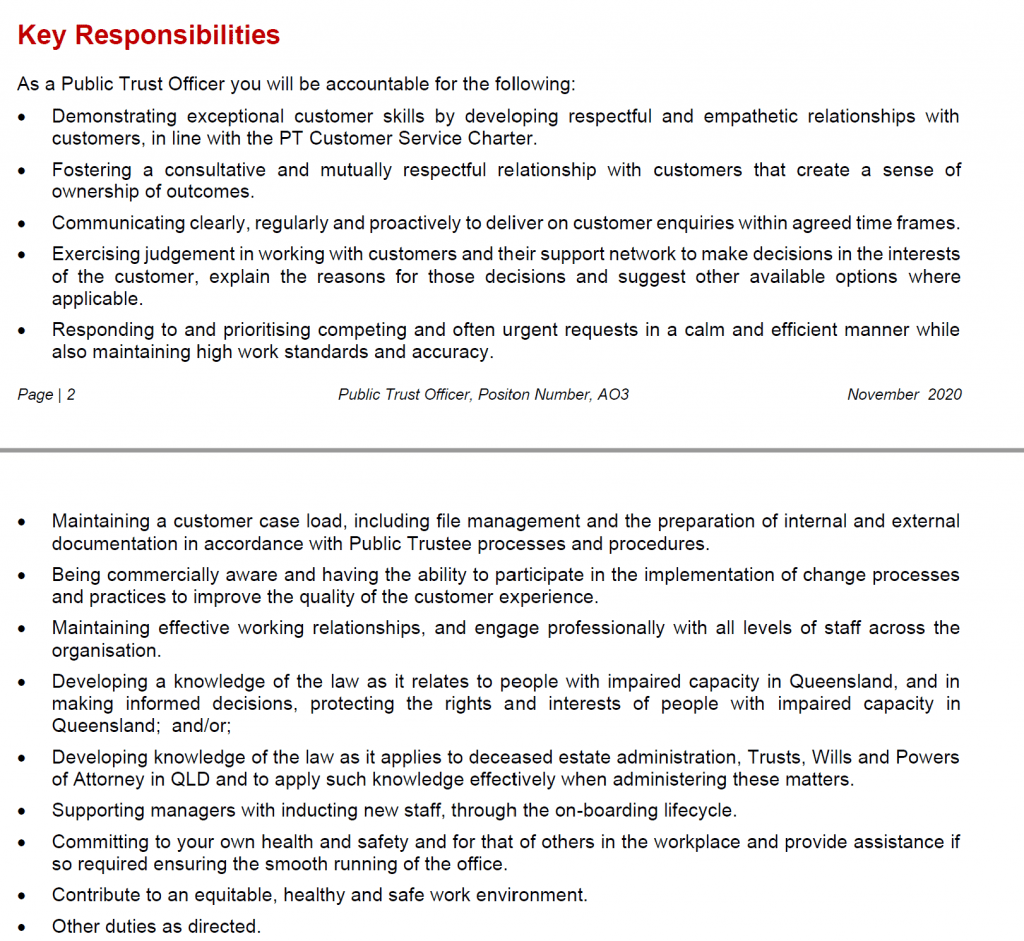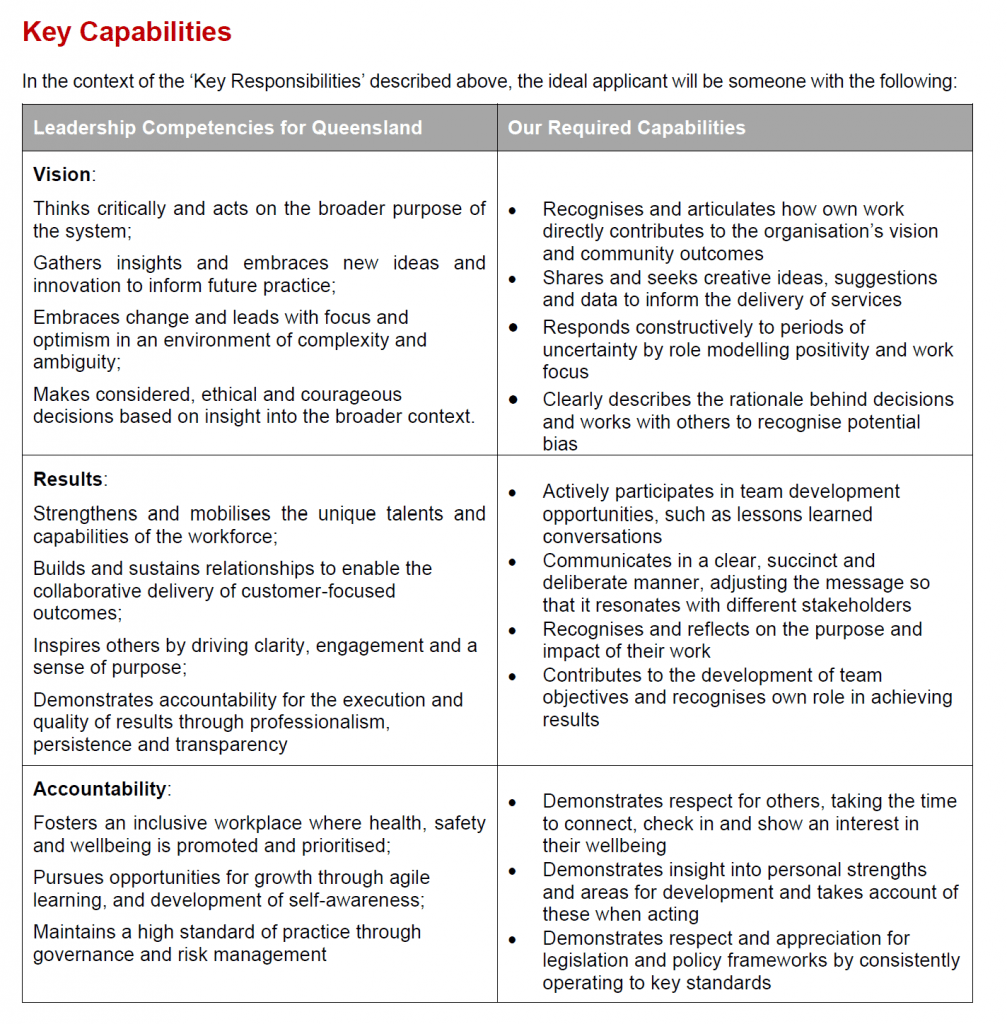This blog discusses the new and becoming more common “One Page Pitch Selection Criteria”.
Selection Criteria are Evolving
Selection criteria frameworks and responses have been static in government for decades. With a few exceptions such as GOC’s like https://www.qic.com.au/ and Statutory Authorities, most government departments have used the “old fashioned” formats.
The evolution in criteria is from the traditional four or five criteria and a response to each in two pages; to a “One Page Pitch Selection Criteria” type response that still addresses all the criteria. How unfair is that? No structure, same criteria and less space.

Why?
Why is this happening? For one, government is modernising. Time is money in the government too and no one has the time or the money to read thousands of job applications looking for one candidate.
This is also happening because it is a writing skill. The best way to respond to a selection criterion on writing skills is not to give an answer of when you’ve written a document; the document you’re writing should say it all. It is very hard to address five criteria in a one page pitch selection criteria without a structure, and, give in depth examples. Those who can do that are showing they have written communication skills! That is handy for the employer not only saving time in recruitment but also in producing written work, day to day in future.
Example – One Page Pitch Selection Criteria
This is an example from a recent job advertisement in Queensland government (PT69/21, Role Title – Public Trust Officer):
To enable the panel to assess your merit, your application should include:
- Your current resume which details your work experience and relevant information to this position.
- A short statement (no more than one page) focusing on your knowledge, skills and attributes as outlined in the key responsibilities and key capabilities.
- Contact details for two work related referees. At least one referee must be your most current or recent supervisor and have a thorough knowledge of your work performance and conduct within the previous two years.
In this example the key responsibilities and key capabilities themselves are 537 words – which is roughly one page. So long story short you’ve got a page to answer a page of criteria.
In the immortal words of Douglas Adams “Don’t Panic“.

Let’s break that down. The responsibilities and capabilities are shown below.
Key Responsibilities

Key Capabilities

Paraphrasing & Synonyms
In my free “Three Simple Steps to Improving Your Criteria Responses” course, I talk in depth about paraphrasing criterion and using synonyms to make them understandable.
The first step to responding to one page of criteria details in one page is to do the same.
First, it’s a customer service role so guess what you can take as read? That the focus of the skills and capabilities is customer service skills!
Customer Service
The first six dot points are related to customer service:
- Demonstrating exceptional customer skills
- Respectful and empathetic relationships
- Consultative and mutually respectful
- Ownership of outcomes
- Communicating clearly, regularly and proactively
- Exercising judgement
- Working with customers and their support to make decisions in their interests
- Explain reasons for decisions
- Suggest other available options where applicable
- Prioritising competing and often urgent requests
- Calm and efficient manner; keeping high standards and accuracy.
- Maintain customer case load
- File management
- Internal and external documentation
When you read over the list, if you work in customer service or deal with customers/clients you can probably cover all of those with one example.
Documents
Within that list there are two documents referred:
- In accordance with Public Trustee processes and procedures
- In line with the PT Customer Service Charter
Because they mention those, you need to locate and read them. Not word for word so you can recite them verbatim, but you need to broadly know what they say. This is because these are the standards and values, they expect you to display in your work so it is important you know them so you can show them in your examples.
Two google searches should take you a few seconds to find: https://www.pt.qld.gov.au/about/our-policies/, and, https://www.pt.qld.gov.au/media/1599/client-service-charter.pdf.
Working Environment
The next seven dot points can also be grouped and understood because they all relate to the working environment:
- Being commercially aware
- Participate in the implementation of change processes and practices
- Maintaining effective working relationships
- Engage professionally with all levels of staff
- Developing knowledge of law as it relates to:
- People with impaired capacity
- Making informed decisions, protecting the rights and interests of people with impaired capacity in
- Developing knowledge of the law as it applies to:
- Deceased estate administration,
- Trusts, Wills and Powers of Attorney
- Supporting managers with inducting new staff
- Committing to your own health and safety and for that of others in the workplace
- Contribute to an equitable, healthy and safe work environment.
Once again, when you read over the list, if you work in a team environment, you can probably cover all of those with one example.
At this point you have broken half a page of criteria into being able to give two work examples.
The next half a page is devoted to capabilities in the context of the responsibilities. They say “The ideal applicant will be someone with the following” and then have a table of skills and qualities.
The clue is in the wording. When they say “The ideal applicant will be someone with the following…” guess what you need to show? That you have those qualities!
Fitting Capabilities into Your Responses
You’ll notice in the heading of the table the references to:
- Leadership Competencies for Queensland
- Our Required Capabilities
I discuss competency frameworks in the selection criteria competency frameworks blog so you can research there to understand more. The “Leadership Competencies for Queensland” column is actually more or less redundant in this context because – the second column “Our Required Capabilities” is where they translate the framework into what they are looking for. So, you can ignore one column. The second column can inform what you need to say in your two examples because they are telling you the examples they want to see!
When they say “Shares and seeks creative ideas, suggestions and data to inform the delivery of services” when you give your example about customer service, you can make sure you also mention a time you suggested an improvement to a service delivery issue. By doing that, you’re telling them what they want to here.
Culling the List
Once again by spending some time going through point by point, you can also cull things from this list you don’t need to worry about because you are talking about them elsewhere. Example being “Communicates in a clear, succinct and deliberate manner, adjusting the message so that it resonates with different stakeholders” is already covered off in the condensed list above from the first six dot points – namely “Communicating clearly, regularly and proactively“.
By going systematically through the page of what they are asking for you can get it down to needing to give two examples – one customer service and one workplace, and, have a list of items you need to make sure you mention.
Simples!
Conclusion
As the Five P’s acronym goes “Prior Preparation Prevents Poor Performance“. Taking the time to read, break down, understand and plan your response is essential.
Share this post
